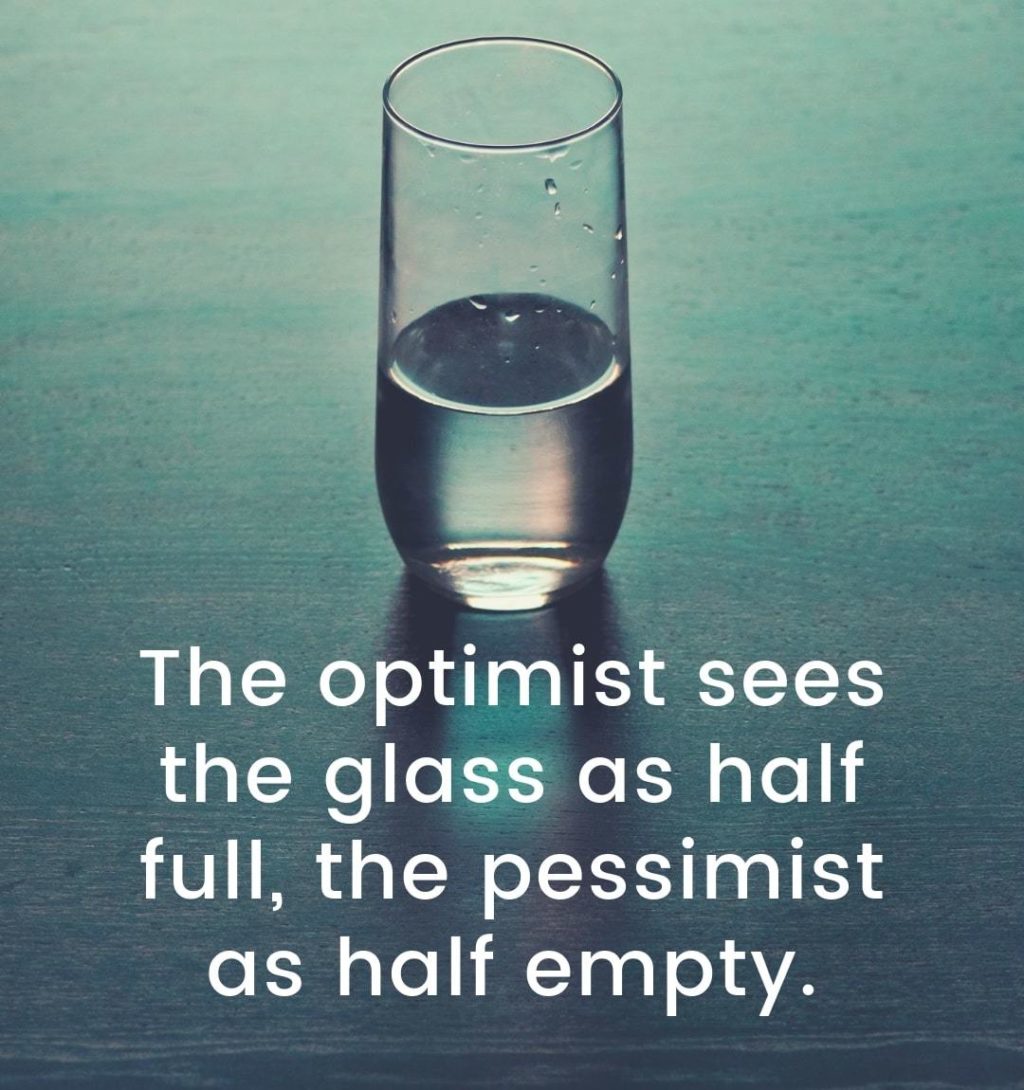There might be affiliate links on this page, which means we get a small commission of anything you buy. As an Amazon Associate we earn from qualifying purchases. Please do your own research before making any online purchase.
If you want a better life, learn the Optimist Creed!
Okay, maybe that statement is a bit hyperbolic.
The optimist’s creed is a great guide for both greater success and happiness in life. But you can be an optimist and never have even heard of the optimist's creed.
The creed itself is just a nice guide to the spirit of being an optimist. But being an optimist – that makes all the difference in life.
So let me rephrase my opening statement.
If you want a better life. Be an optimist.
But why? You may wonder. Why is being an optimist so important?
I am sure you have heard the folk wisdom that optimists are both happier and healthier than their pessimist brethren.
Well, it is true.
Optimism allows you to see opportunities others miss. It makes you healthier. It encourages you to try new things. It inspires people around you. Optimism decreases depression and anxiety. It makes you happier. And optimists have been shown to live longer lives.
(Side note: One proven way to improve your happiness and life satisfaction is to focus on goals that truly matter. To get started, check out this FREE printable worksheet and a step-by-step process that will help you set effective SMART goals.).
In this post, we will discuss what it is to be an optimist. How you can become an optimist. And most importantly cover the “Optimist Creed” – a hundred-year-old guidance on what it takes to be a true optimist.
What You Will Learn
What is an Optimist?
“The optimist sees the glass as half full, the pessimist as half empty.”
When people think of optimism vs pessimism this is the quote they think about. Is this optimism quote a good definition of what it means to be an optimist?
I think not.

This quote is a passive view of optimism. But optimists aren’t passive. They don’t just view the glass as half full, they go about filling the glass with ice cubes and enjoying a refreshing cold drink.
At the core, the “glass half full” optimism quote has some truth. Optimists expect good things to happen to them, and pessimists expect bad things.
But that does not mean that optimists are out of touch with reality. They understand bad things can happen. It is just that optimists also realize that many setbacks also bring opportunity.
An optimist does see reality. We are are not crazy, after all.
Being an optimist does not mean you have an unrealistic viewpoint. It is not about thinking life is full of rainbows and unicorns. Those Pollyanna views are not optimism.
Optimists see the bad things. But try to visualize how they can improve them. More importantly, an optimist takes action and does something to improve bad situations.
This positive action is a hallmark of an optimist. This is what makes the optimists' life a better one than the pessimists.

But enough of my point of view. Let's see what the Optimist Creed has to say about the question of, “What is Optimism?”
The Optimist’s Creed
Promise Yourself…
To be so strong that nothing can disturb your peace of mind.
To talk health, happiness, and prosperity to every person you meet.
To make all your friends feel that there is something in them.
To look at the sunny side of everything and make your optimism come true.
To think only of the best, to work only for the best, and to expect only the best.
To be just as enthusiastic about the success of others as you are about your own.
To forget the mistakes of the past and press on to the greater achievements of the future.
To wear a cheerful countenance at all times and give every living creature you meet a smile.
To give so much time to the improvement of yourself that you have no time to criticize others.
To be too large for worry, too noble for anger, too strong for fear, and too happy to permit the presence of trouble.
To think well of yourself and to proclaim this fact to the world, not in loud words, but in great deeds.

The History of the Optimists Creed
These books that make up the Optimists Creed are dated. Being over 100 years old.
They lack any insight into the modern research that proves many of the concepts of positivity and optimism. But in spite of those drawbacks, this book is a great read.
It inspires. It motivates. It can be a shining light when times get tough.
Most of all the books in the Optimists Creed give a practical path to ditch negative thinking and view life with a more positive outlook.


Optimist Creed SWAG!
Want to show the world you are an optimist and proudly display the Optimist Creed? Some of these items below might interest you. Check out a poster or mug that proudly displays the optimist's creed.
CafePress – Optimist Creed Poster
Perfect for dressing up any wall, or instantly creating a theme for a room.
Printed on only the highest quality mugs. The print will never fade no matter how many times it is washed.

Can a pessimist become an optimist
Over time -yes. But it is something you need to work on and it takes time.
The idea that optimists were happier and healthier than pessimists began as folk wisdom, but through hundreds of experiments over the years has proven to be irrefutably true. (See some of the key research that backs up this statement linked in the resources section below)
In his decades of research into anxiety, stress, and depression, Martin Seligman, the founder of the school of positive psychology began to ask that exact question. “Can a pessimist learn to be an optimist and gain the happiness, health, success and wellbeing benefits of an optimist”
Years of research and subsequent studies have proven that, yes they can. Seligman calls this “Learned Optimism” and discusses the studies and how this works in detail in his excellent book of the same name.
One of the key differences Seligman found is gratitude. Often optimists are thankful for the little things in life they get. This gratitude has a huge effect on their overall wellbeing. If you are interested in gaining a happier and healthier approach to life I encourage you to discover the benefits of gratitude.
It may change your life.
Furthermore, if you want to take action. As all good optimists do… I encourage you to try this simple gratitude exercise. Three good things. Which may be the single best way to easily incorporate more gratitude into your life.

Links to Related Articles & Research
- Ahrens AH, Haaga DAF. The specificity of attributional style and expectations to positive and negative affectivity, depression, and anxiety. Cognitive Therapy and Research. 1993;17:83–98.
- Antoni MH, Lehman JM, Kilbourn KM, Boyers AE, Culver JL, Alferi SM, Yount SE, McGregor BA, Arena PL, Harris SD, Price AA, Carver CS. Cognitive-behavioral stress management intervention decreases the prevalence of depression and enhances benefits
- Armor DA, Taylor SE. Situated optimism: Specific outcome expectancies and self-regulation. In: Zanna M, editor. Advances in experimental social psychology. Vol. 30. San Diego: Academic Press; 1998. pp. 309–379.
- Aspinwall LG, Richter L. Optimism and self-mastery predict more rapid disengagement from unsolvable tasks in the presence of alternatives. Motivation and Emotion. 1999;23:221–245.
- Carver CS, Gaines JG. Optimism, pessimism in Cognitive Therapy and Research. 1987;11:449–462.
- Dember WM, Martin SH, Hummer MK, Howe SR, Melton RS. The measurement of optimism and pessimism. Current Psychology: Research & Reviews. 1989;8:102–119.
- Friedman LC, Nelson DV, Baer PE, Lane M, Smith FE, Dworkin RJ. The relationship of dispositional optimism, daily life stress, and domestic environment to coping methods used by cancer patients. Journal of Behavioral Medicine. 1992
- Gillham, Reivich, Jaycox, & Seligman, 1995 – The Optimistic Child
- Optimism – Clinical Psychology Review – Volume 30 Issue 7 Nov 2010, Pages 879-889
- Learned Optimism: How to Change Your Mind and Your Life – January 3, 2006 – Martin Seligman (see it here)
- Pretzer JL, Walsh CA. Optimism, pessimism, and psychotherapy: Implications for clinical practice. In: Chang EC, editor. Optimism and pessimism: Implications for theory, research, and practice.
- The Optimist Creed and Other Inspirational Classics: Discover the Life-Changing Power of Gratitude and Optimism -Christian D. Larson (See it here)
- Scheier MF, Carver CS, Bridges MW. Distinguishing optimism from neuroticism (and trait anxiety, self-mastery, and self-esteem)

THE PESSIMIST’S CREED
I have said a lot about optimism and the optimist's creed. I only think it is fair to give the pessimists a chance.
This anonymous answer to the optimist creed gives us another point of view. Although, it is surely a tongue-in-cheek look at the “glories” of pessimism.
PESSIMIST CREED
What’s the use of sunshine–
It only blinds your eyes.
What’s the use of knowledge–
It only makes you wise.
What’s the use of smiling–
It wrinkles up your face.
What’s the use of flowers–
They clutter up the place.
What’s the use of eating–
Nothing, only taste.
What’s the use of hustling–
Haste is only waste.
What’s the use of music–
Just a lot of noise.
What’s the use of loving–
Only for the joys.
What’s the use of singing–
Only makes you glad.
What’s the use of goodness–
When the whole world’s bad.
What’s the use of health–
You might as well be sick.
What’s the use of doing anything–
But kick!

Final Words on Optimism
Being an optimist is a great thing.
The world would be a better place with more optimists. People would be healthier, happier and more successful. There would be more gratitude and less anxiety and stress. That world sounds like a pretty good place to me.
Hopefully, you found some inspiration from the optimist creed. Perhaps even use some of them for positive thinking mantras.
If the optimist's creed inspires you, why not print it out and stick it on your wall, fridge or mirror. You can easily use the optimistic lines from the creed as a daily affirmation. Read this a few times a day for long enough and you may find yourself with more optimism.
I have also turned many of the inspirational lines from the optimists creed into images ready for sharing on Pinterest, Instagram or any other social media platform. So feel free to grab them and share them with your social media followers.
I was able to fit many of the images int the body of the article. The ones that didn't fit are stacked below. Enjoy.
Finally, one proven way to improve your happiness and life satisfaction is to focus on goals that truly matter. To get started, check out this FREE printable worksheet and a step-by-step process that will help you set effective SMART goals.
Stay Optimistic!






